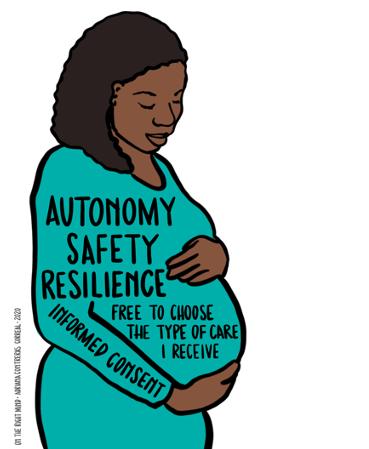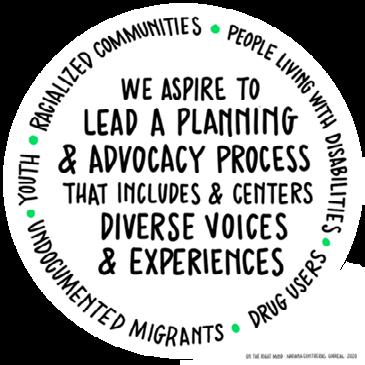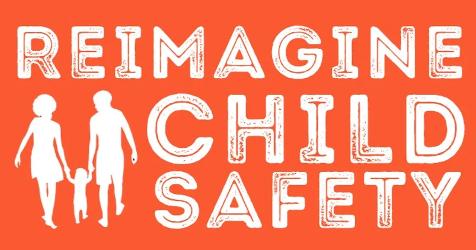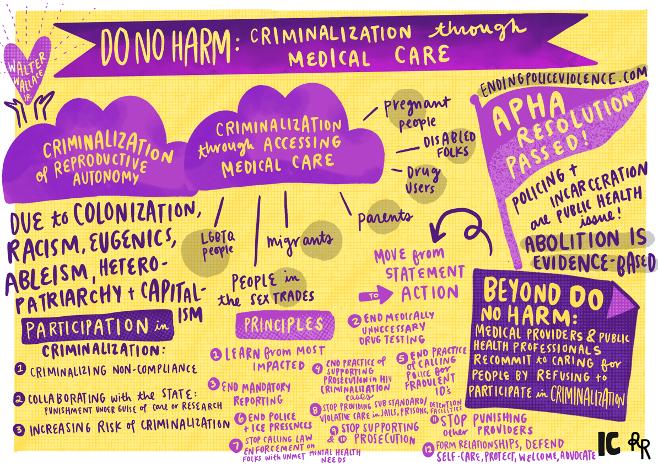
13 minute read
The Urgent Need to End “Test and Report” Practices
Across the country advocates are championing efforts to make sure families can be together and end the “test and report” practices. These efforts are led by people who use drugs, medical professional, activists and advocates alike. Policy-makers must listen to these demands if they seek to repair historical harms, and build structures of support.
A. STATE EFFORTS TO DEMAND INFORMED CONSENT PRIOR TO DRUG TESTING
Advertisement
Several states are working to curb the criminalizing impact of drug testing on pregnant people and their newborns by demanding that medical providers obtain meaningful consent prior to drug testing pregnant people.
It is important to note that the obligation to provide informed consent is already a part of medical provider ethics and the law. Advocates are asking for uniformity in the rights that already exists for patients and demanding power as they do it.
These state policies can all be enacted swiftly. There is no federal barrier to mandated informed consent, in fact there is no federal barrier to ending “test and report practices” more generally.
The Child Abuse Prevention and Treatment Act (CAPTA) does not require hospitals to report substance-exposed newborns to FRS. States can eliminate these policies immediately while federal advocates work to eliminate CAPTA completely.
CAPTA requires states to have a notification process to FRS in place, but these notifications are intended to identify whether the family requires care or services. These notifications are not synonymous with neglect or abuse reports, which trigger investigations that can lead to surveillance, mandated compliance with inappropriate services, and family separation. These notifications are intended to help the state “determine whether and in what manner local entities are providing, following state requirements, referrals to and delivery of appropriate services.”53 Furthermore, CAPTA does not require states to involve FRS in the plan of safe care but instead requires programs that include “the development of a plan of safe care” for infants identified as affected by substance use, withdrawal symptoms, or Fetal Alcohol Spectrum Disorder. Each state determines the nature of a plan of safe care. There is no federal requirement for states to rely on the existing FRS system.54
This section highlights three campaigns that are working to build awareness among the general population, power to the affected communities, and change to the practices around informed consent for pregnant and parenting people.


I. NEW YORK DEMAND FOR INFORMED CONSENT
Advocates in New York are working to eliminate the womb to foster system and are demanding that medical providers obtain informed consent prior to drug testing and/or screening birthing parents or These demands are in response to decades of hospitalinitiated child removals, often triggered by non-consensual drug
The fight for informed consent in New York is well grounded in existing legal frameworks. Specifically, the highest court has already determined that a positive toxicology test alone does not prove neglect, regardless of the substance used,58 and the New York State department already requires hospitals to develop policies and procedures for obtaining informed consent prior to a substance use assessment. However, despite this seemingly progressive landscape pregnancy and drug use has been one of the highest indicators that a parent will come under FRS surveillance.
The NY campaign has resulted in policy changes. For example, in September 2020,60 New York City’s Health and Hospitals Corp. (NYCHHC) changed their internal policies to require doctors to obtain informed consent prior to drug testing pregnant and parenting people. This shift was a direct result of the advocacy and activism of the Informed Consent Coalition. Unfortunately, these changes were not enough. The NYCHHC policy would only be implemented at the city’s public hospitals and would not extend to private institutions or public hospitals outside of New York City. It also did not include newborns, which leaves healthcare providers with the ability to test infants without informed parental consent. The fight for informed consent must continue.
II. CALIFORNIA DEMAND FOR INFORMED CONSENT
In California, advocates in the Reimagine Child Safety Coalition are working in Los Angeles to ensure that medical providers obtain informed consent prior to drug testing.61 A coalition of organizations have also introduced a state bill, AB-1094, to demand informed consent. 62

The law in California, like New York, is clear: “a positive toxicology screen at the time of the delivery of an infant is not in and of itself a sufficient basis for reporting child abuse or neglect.”63 There is also no law specifically criminalizing the use of substance during pregnancy, however there are legal cases that presumptively assume that parents of children under the age of six have neglected their children when they have “abused” substances. This law uses the term “abuse” without any medical or scientific precision, and as such leaves parents who use substances vulnerable to widespread FRS criminalization.64
With the work of activists, Black femmes and advocates the tides are turning. In 2023, AB 2223, went into effect, clarifying that “a person shall not be subject to civil liability or penalty…based on their actions or omissions with respect to their pregnancy.”65 Actions during pregnancy would include drug use, so AB 2223 should apply to prevent FRS agencies from removing children based solely on drug use during pregnancy. Although advocates are hopeful, there is still a long history of family separation in California as a result of hospitalinitiated drug tests and reporting. Moreover the culture of criminalization persists, and there is a definite need for medical providers—at minimum—to be providing meaningful informed consent prior to drug testing of parents, as well as ending medically unnecessary drug tests altogether. It would be a first step to building the trust that pregnant Californians deserve.
III. MARYLAND DEMAND FOR INFORMED CONSENT
In Maryland, Bloom Collective – a collective group of perinatal and postpartum practitioners dedicated to maternal health, birth and reproductive justice, and community sustainability – in partnership with the Office of the Public Defender are also working to ensure that pregnant and parenting people are armed with the right to informed consent before being screened or tested during pregnancy or childbirth. Like New York and California, Maryland’s law also states that a positive drug test—alone—is not enough to prove child neglect under Maryland law.66 However, the reality is that families face FRS intervention frequently because of a positive drug test. This is, in part, due to Maryland’s law that requires that healthcare providers to report any positive test or screen to the Department of Social Services (DSS). While healthcare providers are not required by any state or federal law to drug test, most, if not all, Maryland hospitals have adopted universal test and report policies.
Currently, the law requires that if a person tests positive during or after childbirth for any controlled substance, including prescribed ones, they must be reported to the local Department of Social Services for a “Substance Exposed Newborn (SEN) referral.”67 Officially, SEN referrals include an assessment of the family’s strengths and connections to services, however in practice this is rarely the case. After the assessment is concluded parents who used drugs are referred to programs that are supposed to be “voluntary” but if a parent refuses these services an investigation ensues.68 The Bloom Collective and the Maryland Office of the Public Defender have been working to pass informed consent legislation for two years. The legislation has failed to be voted out of committee in both 2022 and 2023, receiving opposition from the Maryland Hospital Association, Maryland Association of Obstetricians and Gynecologists, MedChi, Maryland Patient Safety, and the Maryland Department of Human Services. They are continuing their fight to decriminalize pregnancy and parenting for people who use drugs, and believe that informed consent can be a way to intervene and interrupt this web of criminalization, giving patients the time to understand the consequences of consent.
IV. NON NEGOTIABLE COMPONENTS OF INFORMED CONSENT
People impacted by FRS have combined with reproductive and birth justice advocates, lawyers, academics, and medical professionals in NYC to determine what informed consent looks like for pregnant and parenting people who use drugs. It is imperative that policy makers listen to these advocates who have actually experienced FRS either first hand or through daily advocacy interactions. Their expertise is unparalleled.
There should be no law passed around informed consent that does not at least require the following:
1. Informed Consent is permission granted by the patient with full knowledge of all possible risks and consequences.
This is consistent with The American College of Obstetricians and Gynecologists which recommends that, “Before performing any test on the pregnant or neonate, including screening for the presence of illicit substances, informed consent should be obtained from the pregnant person or parent. This consent should include the medical indication for the test, information regarding the right to refusal and the possibility of associated consequences for refusal, and a discussion of the possible outcome of positive test results. In addition, obstetricians-gynecologists or other obstetric care practitioners should consider patient self-reporting as an alternative, which has been demonstrated repeatedly to be reliable in conditions where there is no motivation to lie and in clinical settings where there are no negative consequences attached to truthful reporting.”
2. Informed Consent must be obtained prior to drug testing and drug screenings.
In recent years, some medical providers have recognized the highly invasive nature of obtaining bodily fluids like urine or blood from patients and have opted to shift practices to using surveys, questionnaires or conversations to elicit information about drug use. Questions range from types of substances used to frequency, intensity, and triggers for use. There is a perception that these screenings, whether random, selective, or universal, are less invasive than drug testing and could reduce reporting disparities. However, a recent study found that Black and white pregnant people screened positive for substance use at similar rates and Black women entered treatment programs at increased rates;69 Black babies were still four times more likely to be reported to FRS at delivery and have 172% higher odds for being tested 70 This is unsurprising and consistent with the history of racism in the US, the segregationist policies which undergird FRS and the actual intent of family separation laws. The history of Family Separation in the U.S. necessitates that informed consent be obtained regardless of the testing/screening tool. Families who use drugs are criminalized and need to understand the consequences of their consent as they work to keep their family together.
3. Informed Consent must be obtained prior to Drug Testing/ Screening Newborns AND their Parents.
Informed consent law needs to include newborns; time and time again, directly impacted people and advocates on the front line report that pediatricians, in particular, will ignore parents and just drug test children—a practice called “bagging” to refer to the process of capturing urine from a newborn by putting a bag around their genitals. If the law is not extended to newborns, likely in situations where parents refuse testing, health care providers will instead subjugate that person’s new baby to drug testing. Black, Brown, Indigenous and Low-Income children deserve bodily autonomy and studies confirm that they are at higher risks of drug testing without clear medical need.71 There is no medical exception that justifies bypassing informed consent from parents in the case of newborn drug testing. Every other test and procedure requires parental consent (except in the case of emergency), such as routine “heel and prick” tests that screen newborns for congenital defects. It would be illogical not to extend this protection in the case of drug testing. Moreover, this is a valuable opportunity for a provider to talk to parents about their individual wellbeing and that of their child, provide honest and accessible information and options, and make connections to systems that provide support–as well as for providers to interrogate what actual medical purpose (if any) is being served with the drug test.
4. Informed Consent Laws Must be Rooted in Birth Justice and Reproductive Justice Principles.
Informed Consent Laws that function as “advisory” or “legal rights” are not the same as Informed Consent Laws rooted in the right to bodily autonomy and reproductive justice. Indigenous women, women of color, and trans people have always fought for Reproductive Justice—which defined by SisterSong72 is the “human right to maintain personal bodily autonomy, have children, not have children, and parent the children we have in safe and sustainable communities.” It must be clear that hospitals must be providing informed consent that is consistent with reproductive justice principles—which is rooted in the patient’s autonomy not the hospital’s interest. Moreover, it demands that informed consent be more than a legal waiver or cursory conversation but rather a meaningful process that shifts power away from the institution and into the hands of the pregnant and parenting person. Informed consent, cannot exist without bodily autonomy, meaningful choice, and the ability to refuse consent without punishment.
5. Informed Consent Laws Must Explicitly Require the Following Components:
– Right to be informed in the language of the patient’s choice
– Requirement that written permission is obtained prior to testing or screening
– A right to notification that the disclosure or test results could have legal implications (such as FRS interaction)
– A right for the patient to have the opportunity to make a voluntary decision (this means there is time to discuss options)
– A right for the patient to seek legal or outside support
– An explanation and documentation of the medical purpose of the test
– The right to refuse consent on behalf of themself or their child in nonemergency situations, without losing access to treatment or facing other consequences as the result of refusal
B. ORGANIZING FOR LIBERATION
Informed Consent laws are an intervention into the web of criminalization, and should be adopted, however there will need to be radical changes in both hospital policy and culture to shift the criminalization of pregnant people who use drugs. Efforts like the Beyond Do Harm Network— a group of US-based health care providers, public health workers, impacted community members, advocates, and organizers working across racial, gender, reproductive, migrant and disability justice, drug policy, sex worker, and anti-HIV criminalization movements—are successfully working to address the harm caused when health providers and institutions and public health researchers and institutions facilitate, participate in and support criminalization.73
This network offers 13 principles for supporting people’s agency, selfdetermination, dignity of risk, and general wellbeing to interrupt the criminalization of patients in medical systems. Some of these efforts include: ending medically unnecessary information gathering, documentation, and surveillance; ending medically unnecessary screening and drug testing without consent, and ending mandated reporting. Moreover this network highlights the need for providers to self-organize and challenge their institutions to adopt and administer policies that will create safety for their patients.
Harm
US-based care providers, health workers, impacted community members, advocates, and organizers working across racial, gender, reproductive, migrant and disability justice, drug policy, sex worker, and anti-HIV criminalization movements to address the harm caused when health providers and institutions and public health researchers and institutions facilitate, participate in and support criminalization. Below we offer thirteen principles for supporting people’s agency, self-determination, dignity of risk, and general wellbeing.











